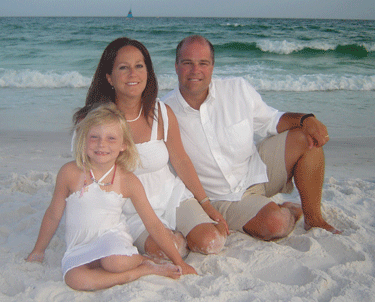Adam's Heart Valve Surgery Blog – Page 71
Thanks To ABC For “Hopkins” Mini-Series
By Adam Pick on August 13, 2008
Earlier this summer, we chatted about the debut of “Hopkins” on ABC and the sometimes, overly dramatic Grey’s Anatomy.
Well… Robyn (my wife) and I just watched the seventh-and-final episode of this very unique, very touching mini-series about the reality of working at Johns Hopkins Medical Center in Baltimore Maryland.

Gail’s Pounding Heartbeat Question Triggers A Memory
By Adam Pick on August 9, 2008
There are some things about my aortic valve replacement surgery that I will never, ever, never, ever, nehhhhh-verrrrr forget. (To learn more, click here.)
One such memory is that of my LOUD and POUNDING heartbeat on the second night home from the hospital. It was around 10pm on a Monday evening. Robyn, my wife, had just laid down next to me in bed. We talked for a bit and then, after exchanging “I Love Yous”, we entered that silent period right before sleep.
As we laid quietly in the dark, my new heart decided to make its presence known. A “Bum-Bump” rattled in my chest and head. Then another “Bum-Bump”. It became louder and faster “BUM-BUMP! BUM-BUMP! BUM-BUMP!” I instantly became fixated on the loud repetitive sound. In fact, I became thrilled knowing that my heart valve flaps were working so well. (Fyi, your heart valve leaflets make the “Bum-Bump” sound in your heart as they open-and-close.)
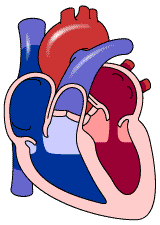
From ICU Nurse To ICU Patient To Cardiac Depression… Carol’s Story
By Adam Pick on August 9, 2008
I just received this wildly coincidental email from Carol. It’s amazing to read about Carol’s perspective on heart valve surgery, considering she was formerly an intensive care unit (ICU) nurse. Here is what she wrote:
Dear Adam,
Thank you! Thank you! Thank you for sharing your experience in your book. I am 6 weeks post-op mechanical aortic valve replacement (Carbomedics). Now, here’s the weird part…
I was a patient in the same ICU that I was the Charge Nurse of back in the 1970’s! They say “a little knowledge is a dangerous thing”. I was VERY aware of my post-op complications as they were happening. Receiving four units of blood and going into a rapid atrial fibrillation with a heart rate of 150-160 several times was a unique experience!
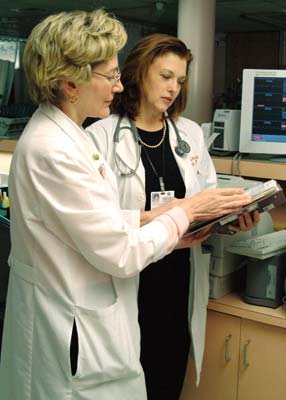
Jason’s 26 Year Old Bjork-Shiley Mechanical Valve Stays Put
By Adam Pick on August 9, 2008
One of the most common questions I get relates to the life expectancy of heart valve replacement devices. It’s a great question that fundamentally underlies a critical patient concern. That concern is the fear of a second cardiac surgery operation.
In prior blogs, I have written about the life expectancy of pig valves, cow valves and human donor valves. Earlier today, I received an interesting email from Jason about the longevity of his Bjork-Shiley mechanical heart valve replacement. Here is what Jason had to say:
“Hi Adam – I just came across your website. I had my aortic valve replaced in 1982, at 29 years of age. I have just found out that I need surgery for an aortic aneurysm, I’m 55 now. I have a Bjork-Shiley mechanical valve. I asked my surgeon if he would be replacing the valve while he was in there, since it is now 26 years old. I was surprised to hear that he wouldn’t be, unless there were problems with it. Thanks. Jason”
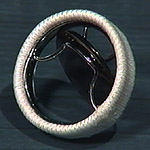
Frustration, Nerves, Leaking Heart Valves, Test Results And Non-Surgical Options
By Adam Pick on August 9, 2008
Dan, from California, wrote me an interesting email that I could relate to whole-heartedly. Here is Dan’s email and my response:
Adam,
I have always been very healthy, normal blood pressure and EKG, no problems. I am 65, low cholesterol, slender, no health history problems, and I do not smoke. Body scanning reveals no blockages.
After noticing some breath shortness after briskly walking, my doctor suggested a stress echo EKG test, which I had done yesterday. The tech and the doctor administering the test wouldn’t say anything, other than the tech saying the pictures appeared okay – a “good squeeze”.

“No-Blood” Open Heart Surgery For Jehovah’s Witnesses… For Cindi’s Mom
By Adam Pick on August 9, 2008
It doesn’t matter what sex you are, what race you are, what country you are from or what religion you are… Heart valve disease has and will continue to impact most segments of the population.
Recently, I received a note from Cindy about her mother who needs heart valve replacement. Cindi’s mother is Jehovah Witness. As a result of her faith, Cindi’s mother requires a no-blood surgery. She writes to me, “Dear Adam – My mother was recently diagnosed with needing aortic valve replacement and a bypass. She is a Jehovah’s Witness and requires “no-blood” open heart surgery. Do you personally know of anyone ever having this done? My brothers and sisters and I are gravely concerned. We have our doubts about the no-blood heart surgery. I would love to hear from you. Cindi”

So you know, I’ll be the first to admit when I don’t know something. And, this question definitely positioned me in the land of “I don’t know.” That said, I was very intrigued to learn more about practices of Jehovah’s Witnesses as it relates to no-blood or bloodless surgery.
Restarting The Heart After Surgery… A Fear For Barbara’s Husband
By Adam Pick on August 5, 2008
I’ll never forget my reaction when Doctor Vaughn Starnes explained to me the procedure for cooling, stopping and restarting my heart.
“So let me get this straight,” I emphatically questioned the gray-haired guru, “You’re going to stop my heart, cool it, fix it and then restart it using an electric shock?”
Doctor Starnes paused, looked calmly into my eyes and then replied with a simple, unemotional one-word response, “Yes.”
“Ohhhhhhhhh-kaaaaaay,” I slowly muttered in a humble daze as I pondered the magic of modern medicine.
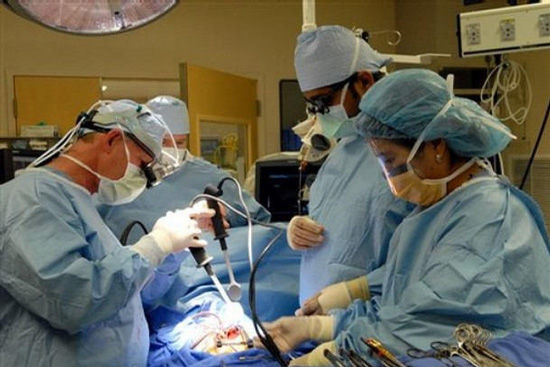
Caring For A Heart Surgery Patient: Ideas For Molly?
By Adam Pick on August 5, 2008
Sometimes when I write these blogs, the process is effortless. I sit down. I start writing. And… POOF! Five, ten or fifteen minutes later I have a draft specific to the question or topic at-hand.
Well… Not this time. Why? Well, I just received a question from Molly that reads, “What is the best way to care for a heart surgery patient?”
As I sat in front of my computer, I began to think about all the different elements (pre- and post-operative) that my own support group had to deal with – including the shock of diagnosis, getting a second opinion, finding the right surgeon, selecting the right procedure, my five days in the hospital, and of course, the challenges of heart surgery recovery (cardiac depression, pain, etc.).

In light of all that, a single answer to Molly’s question escaped me.
Heart Valve Flaps – What Are They? How Do They Work?
By Adam Pick on August 5, 2008
I just received a question from Laura which asks, “My mom was recently diagnosed with a mitral valve regurgitation problem. During her discussion with the cardiologist, he said that her valve flaps were not closing tightly and causing a leak. What exactly does this mean?”
Understanding heart valve anatomy is critical to better understanding the diagnosis of heart valve disease and the surgical steps required to fix the problem. That is why this question about heart valve flaps is such a great inquiry.
Heart valve flaps are also known as heart valve leaflets. The flaps, or leaflets, are composed of tissue. The flaps sole purpose is to open-and-close tightly to secure that blood flows through the heart in one direction. Each heart valve has three (3) heart valve flaps, except for the mitral valve which has two (2) heart valve flaps. Below you can see two diagrams of the human heart* with the white valve flaps in the opened and closed position.
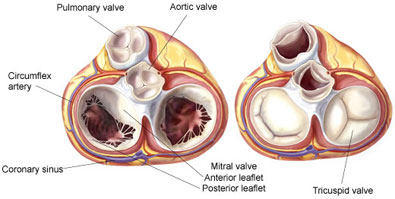
After Mild Stroke And Vietnam, Vernon Prepares For Aortic Valve Replacement Procedure
By Adam Pick on August 5, 2008
The patient stories that arrive in my inbox are nothing short of inspirational. Here is the story of Vernon Young from Indiana. He writes:
Adam,
I’m scheduled for surgery next Wednesday – like you, I have to be at St. Vincent’s Heart Center of Indiana at 7AM. I have a great surgeon, Dr. Robert J. Robison, who will be performing the surgery.
I’m 63 years old and have known that I had some form of functional heart defect since I was 20. It was discovered by a United States Air Force (USAF) physician during my final physical before being assigned to Vietnam in 1965. At that time, it was not a problem… at least my USAF physicians didn’t think so.
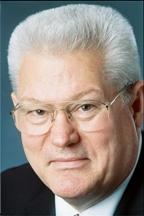
Homograft Video: Aortic Valve Replacement Dr. Kevin Accola
By Adam Pick on August 5, 2008
One of the most, highly regarded cardiothoracic surgeons I know is Dr. Kevin Accola from Florida.
Lucky for us, I just found a video that features Dr. Accola as he works on a patient requiring aortic valve replacement due to a congenital, bicuspid aortic valve. As you can see in this story Dr. Accola uses a homograft valve to replacement the patient’s defective valve.
Keep on tickin!
Adam
After Aortic Valve Replacement, Dean Gets ‘Cheesecake Factory’ Delivered To Colorado Hospital
By Adam Pick on August 2, 2008
I’m incredibly lucky to receive touching and memorable letters from heart valve surgery patients and caregivers all over the world. In particular, I consider it a special honor when one of my book readers includes me on his or her email list during their heart surgery recovery.
Just today, Dean (from Colorado) sent me this wonderful email which illustrates his appreciation for his support group and his VERY RECENT heart valve replacement. I thought you might like to hear Dean’s thoughts on his hospital experience, so I asked him for permission to share it in this blog. Without further ado, here it is:
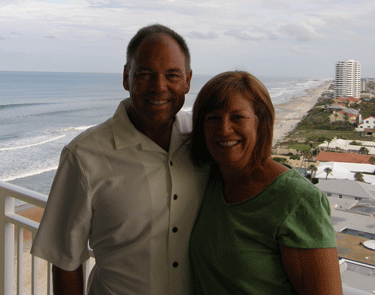
Is There A Way To Naturally Reduce Mitral Valve Regurgitation?
By Adam Pick on August 2, 2008
One of the most popular forms of heart valve disease is mitral valve regurgitation. In fact, reports suggest that the mitral valve is the most commonly operated on heart valve.
As a result, I receive a lot of questions about mitral valve replacement and mitral valve repair. Earlier today, I received a question from Kim that reads, “Is there any way to naturally reduce mitral valve regurgitation?”
If you’ve been to this blog before, you know that I am an optimist. I believe that anything is possible. So it would be unlike me to answer that question with a definitive “no”. Interestingly enough, I have heard of some miracle stories from patients in which valve disease issues have mysteriously vanished over time.
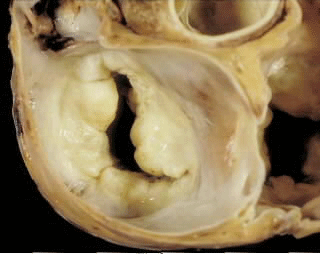
Thanks For The Blog Feedback Everybody!!!
By Adam Pick on August 2, 2008
Hey everybody,
I just wanted to take a quick moment to thank you for all your incredible feedback and constructive criticism (following my request for ways to make this blog better). So you know, I received a ton of great ideas to enhance this fast-growing community of heart valve patients and caregivers.
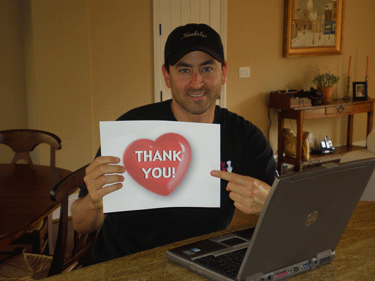
Some of the key feedback items included:
- Add a video playback device into the blog that plays heart valve surgery clips and patient stories;
- Provide chat functionality so that our users can communicate in real-time;
- Create a patient success story directory;
- Enhance the navigation (links) throughout the blog;
- Consider adding a forum or Wiki-like tool to let users actively contribute content to the website.
I could go on-and-on-and-on. Instead, I’ll simply let you know that I will be working to improve this site over the next six months.
Again, thanks for all your excellent thoughts and guidance!!!
Keep on tickin!
Adam
Take A Guess: How Many Annual Open Heart Surgery Operations?
By Adam Pick on July 29, 2008
Do you know how many open heart surgeries were performed in the United States during 2005?
Want to take a guess? Go ahead… Close your eyes and think about it. Okay. Now open your eyes.
(Scroll down for the answer.)
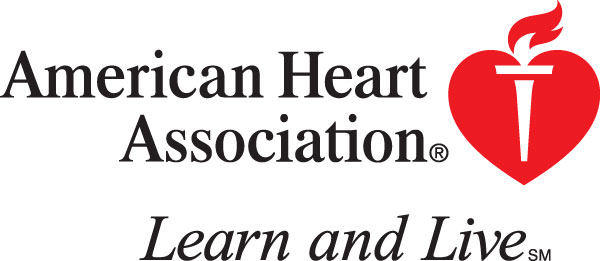
According to the American Heart Association, the number of annual open heart surgeries performed in the United States was approximately 699,000 during 2005. The break-down of some open heart surgeries, by procedure, was:
- Bypass (cardiac revascularization) – 469,000
- Heart transplants – 2,200
- Valve replacements – 106,000
Why did I write about this?
Well. I am hopeful that it will help future patients and caregivers better understand that open-heart surgery, while complex and risky, is a relatively routine procedure. Click this link to further dispel your fear of heart surgery.
Keep on tickin!
Adam
For Dave And Jeff… Why I Chose The Ross Procedure For My Aortic Valve Replacement?
By Adam Pick on July 29, 2008
Once diagnosed with severe aortic heart valve disease (stenosis) and an enlarged heart, I went into action mode.
Yes. I was confused. Yes. I was scared. Yes. I may have even been a little bit depressed (and a tad angry).
Still, my heart needed to be fixed quickly. Dr. Chaikin, my second opinion cardiologist, had given me 30 days to relieve the stress and strain on my dilated (enlarged) heart. Otherwise, Dr. Chaikin told me there could be more damage to my cardiac muscle.
During the surgeon selection process, I set up interviews with surgeons including Dr. Starnes (USC Medical Center). I would use this time to evaluate my potential surgeons and my options for valve replacement devices (mechanical, tissue, homograft valves) and surgical procedures (open heart, minimally invasive, robotic, ross procedures).
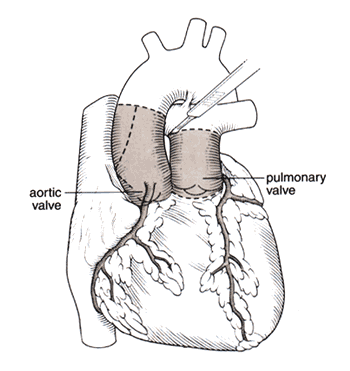
Cartoon – The Type Of Surgeons You Want To Avoid!
By Adam Pick on July 29, 2008
Even though the cartoon (below) got me to chuckle, I really thought to myself, “These are EXACTLY the type of heart surgeons patients should avoid!”
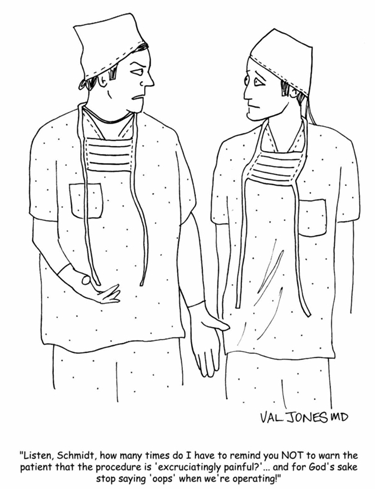
I’m The Target! Please Criticize Me And My Blog!
By Adam Pick on July 29, 2008
Hey everybody,
Thanks for all your nice emails and comments. However, do me a favor… PLEASE CRITICIZE ME AND MY BLOG! That’s right. Fire away. I’m the target pictured below! And… there is no need to be nice about it.
“Why is Adam asking me to do this?” you may be wondering.
Well… I want to make this blog better. The only way I can do that is to ask YOU for honest feedback. So please, please, please help me out (if you have a moment). What do you like about the blog? What do you dislike about the blog? What other features would you like included in the blog?
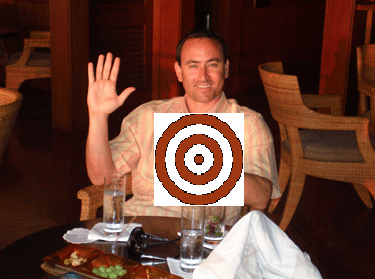
I’m open to any and all suggestions. I really want to make this website a helpful resource for all patients and caregivers preparing for, or recovering from, heart valve surgery.
You can either leave a comment below or send me an email at adam@heart-valve-surgery.com. I’ll get back to you asap.
In advance, thanks.
Keep on tickin!
Adam
Were You Asymptomatic Upon Diagnosis Like Sherri?
By Adam Pick on July 23, 2008
If I had to define the process of being diagnosed with heart valve disease in one word, I would use the word “dislocating”. I’ll never forget my initial diagnosis from Doctor Bad Bedside Manner. And, I’ll never forget those strange feelings of, “Oh my gawwwwd. Is this really happening? Open heart surgery? Am I going to die?”
As you would imagine, I’m not the only patient to experience those dislocating feelings and emotions. What made my situation more challenging to digest… I was almost completely asymptomatic. Of all the leaky heart valve symptoms, I only had one symptom.
Guess what? I’m not the only patient to experience that strange combination of being asymptomatic and being diagnosed with heart valve disease – aortic valve stenosis or mitral valve regurgitation. In fact, I just received an interesting email from Sherri (pictured below with Farah, her dog) about this exact topic.
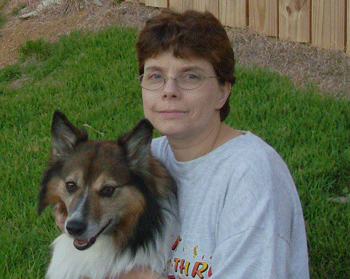
Melissa Causey, 11 Months After Ross Procedure Surgery… Feeling Great!!!
By Adam Pick on July 22, 2008
There is nothing better than hearing from one of my readers after their open-heart surgery recovery is complete.
Recently, I received a very nice note from Melissa Causey. As you might remember, Melissa had a Ross operation in 2006 by Dr. William Ryan in Texas. She attached a recent picture that I have posted below.
